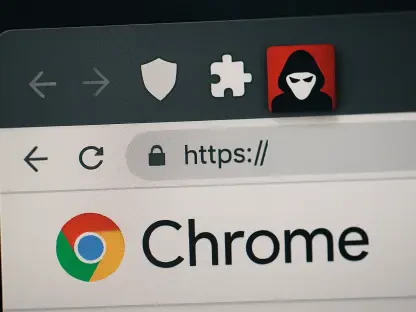Millions of users depend on the Android TV OS for a seamless, integrated experience with their Google accounts. However, a significant security loophole recently uncovered in the platform posed a severe risk to user data, prompting swift action from Google. The flaw permitted unauthorized access to users’ Gmail and other sensitive Google services without requiring authentication like a password or PIN. This revelation has brought to light the critical need for robust security measures across all devices utilizing Google accounts.
Discovery of the Security Loophole
Nature of the Vulnerability
The critical flaw was uncovered through a process that allowed users to sideload Google Chrome onto an Android TV OS device. Normally, Chrome is not available in the Play Store for these specific devices. However, sideloading enabled users to automatically sign into Gmail and other Google services using the existing Google account on the device, effectively bypassing the usual requirement for a password or PIN. This vulnerability highlighted a significant oversight in how Google account security protocols were implemented across different types of devices.The primary risk stemmed from the fact that sideloading Chrome could be easily achieved through other browser apps available on the Play Store. This backdoor provided an alarming avenue for unauthorized access, especially in environments where the TV might be shared or publicly accessible. For instance, in hotels, offices, or even homes with multiple users, the capability for someone to sideload Chrome and gain immediate access to another individual’s email and possibly other sensitive data represented a palpable security threat.
Public Demonstration and Reactions
The security issue gained substantial public attention when technology enthusiast Cameron Gray demonstrated the exploit on his YouTube channel. This demonstration not only captured significant viewer engagement but also sparked widespread concern from users and cybersecurity experts alike. The video elucidated the simplicity and rapid execution of the exploit, leading to heightened awareness about the potential risks associated with Android TV OS.Heightened scrutiny from the media further amplified the issue, eventually catching the attention of legislative bodies. Notably, the office of U.S. Senator Ron Wyden initiated a privacy review, emphasizing the potential national implications of such a security lapse. The combination of public demonstrations and interest from lawmakers underscored the severity of the vulnerability, emphasizing the urgent need for a comprehensive response from Google. This level of legislative interest served to accentuate the broader implications of digital security in our increasingly interconnected world.
Google’s Initial and Progressive Responses
Initial Stance of Google
Initially, Google appeared to believe that the observed behavior aligned with the system’s designed operational parameters. This stance implied that under usual circumstances, particularly in private settings, the risk posed by the flaw was minimal. Consequently, Google’s early response suggested that the company did not view the issue as a critical security threat warranting immediate action. However, the nature of the exploit revealed that the potential for misuse in public or unsupervised environments was significantly high, prompting further reconsideration.As media coverage on the security loophole continued to rise, it became evident that the ease of access to sensitive data through this exploit had far-reaching implications. Public outcry, underscored by growing concerns about the ease with which unauthorized individuals could exploit the flaw, necessitated a reassessment of Google’s initial stance. This mounting pressure from both the public and security experts eventually led Google to take more decisive action to address the vulnerability effectively and to reassure users of their commitment to safeguarding private data.
Implementation of the Security Fix
Upon further evaluation and persistent reporting from media outlets such as 404 Media, Google shifted its approach and committed to actively addressing the vulnerability. Recognizing the potential threat, Google formally acknowledged the risk and announced the implementation of measures to prevent such exploits. These measures included security updates designed to block the automatic sign-in process when Chrome was sideloaded onto Android TV OS devices, thereby eliminating the straightforward access to user data.Testing conducted by tech news platform 9to5Google indicated that the latest updates on devices like Chromecast successfully mitigated the sideloading exploit. This effectively suggested that Google’s technical fixes were operational and addressed the core issue. By preventing Chrome from supporting automatic sign-in under sideloaded conditions, Google aimed to eliminate the primary vulnerability. This response demonstrated Google’s commitment to rectifying the root of the problem and ensuring user data remained secure.
Technical Aspects and Broader Implications
Details of the Security Measures
The technical fix focused substantively on disabling the automatic sign-in feature for Gmail and Drive via Chrome on Android TV OS devices. By targeting this core functionality, Google sought to ensure that unauthorized access through sideloaded applications would no longer be feasible, thus bolstering user data protection significantly. The security measure involved applying restrictions that prevented Chrome from bypassing authentication protocols when utilized outside its intended environment. This action underscored Google’s dedication to quickly adapting and resolving emergent security challenges in its product suite.This fix marked a proactive step toward securing user data against potential threats. The importance of maintaining stringent security protocols across all devices—whether they be high-risk computers or seemingly low-risk smart TVs—was reinforced. Google’s response highlighted the necessity of having robust digital security practices and underscored how interconnected digital ecosystems and cloud-based services demand continuous vigilance and adaptive security measures to safeguard user interests.
Importance of Continuous Security Vigilance
This incident underscores a broader issue: as digital ecosystems become more interconnected, the necessity for stringent security measures across all platforms intensifies. Devices historically deemed low-risk, such as smart TVs, are evolving into gateways to critical cloud-based services, demanding the same level of security vigilance as computers and smartphones. This evolution means that seemingly innocuous household devices are no longer exempt from potential exploitation and must be suitably protected.The situation serves as a pertinent reminder of the importance of consistent software updates, patches, and user education in maintaining secure digital environments. Regularly updating devices and educating users about potential security risks are fundamental components in mitigating vulnerabilities effectively. Google’s approach to addressing this specific security flaw not only protected users but also underscored the broader imperative for continuous innovation and vigilance in digital security practices.
Public Accountability and Consumer Advocacy
Legislative and Consumer Pressure
The role of public demonstrations and legislative oversight exemplifies the profound impact that consumer awareness and advocacy can have on corporate responsibility. The involvement of Senator Ron Wyden’s office, coupled with the extensive coverage of the exploit by 404 Media, played a critical role in compelling Google to prioritize and expedite a security fix. Such instances highlight how public accountability can serve as a powerful driver in ensuring that corporations remain vigilant and responsive to potential security threats.The demonstrated exploit and subsequent reactions underscore the importance of an engaged and informed public, capable of pushing for necessary changes to protect user interests. When consumers and legislators alike draw attention to security vulnerabilities, it prompts companies like Google to act swiftly and decisively. These dynamics ensure that technological advancements do not come at the cost of user security and privacy.
Ongoing Commitment to User Security
Millions of users rely on the Android TV OS for a seamless, integrated experience with their Google accounts. However, a significant security vulnerability was recently uncovered in the platform, posing a serious risk to user data and prompting swift action from Google. This flaw allowed unauthorized access to users’ Gmail and other sensitive Google services without requiring any form of authentication, such as a password or PIN.The exposure of this vulnerability has shed light on the pressing need for enhanced security protocols across all devices that utilize Google accounts. The incident has raised questions about the overall security infrastructure of Android TV OS and other related services, emphasizing the importance of rigorous security measures. Google has since implemented fixes to address the issue, but the event serves as a stark reminder of the continual challenges in maintaining data security in our increasingly digital world. Users are now more aware than ever of the necessity for robust protective measures to safeguard personal information on all platforms.









